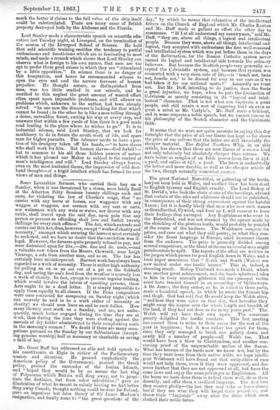Mr. Grant Duff has addressed an able and bold speech
to his constituents at Elgin in review of the Parliamentary session and situation. He praised emphatically the American policy of the Government, praised the Greek policy, praised the surrender of the Ionian Islands, and "hoped they would be by no means the last ring Polyerates which Britain will fling away, not to propi- tiate the destinies, but from sober calculation ;" gave an illustration of what he meant in calmly hinting we had better fling away Canada, thought nothing could be done for Poland, gave an ingenious but false theory of Sir James Hudson's resignation, and finally came to "the great questions of the day," by which he means that relaxation of the intellectual fetters on the Church of England which Mr. Charles Buxton and Mr. Duff made so gallant an effort the other day to commence. "If I at all understand my countrymen," said Mr. Duff, "they are, above all things, a logical and intellectual people. Because they were, above all things, intellectual and logical, they accepted with enthusiasm the first well-reasoned and intellectual system which was put before them in the days of the Reformation, for the Roman Catholic system never turned its logical and intellectual side towards the ordinary believers. But because the Scottish people very generally ac- cepted the Calvinistic system, and because that system was connected with a very stern rule of life,—is 'touch not, taste not, handle not,' to be dinned for ever in our ears as if we had taken it for our national motto ?" Assuredly we trust not. But Mr. Duff, intending to do justice, does the Soots a great injustice, we hope, when he puts the fascination of Calvinism as merely consisting in. its "logical and intel- lectual" character. That is n what can captivate a great people, and still retain a sort of lingering hold on even so great a mind as Mr. Carlyle's. Mr. Duff made a brilliant, and in some respects a noble speech, but we cannot concur in his philosophy of the Scotch character and the Calvinistic faith.


































 Previous page
Previous page